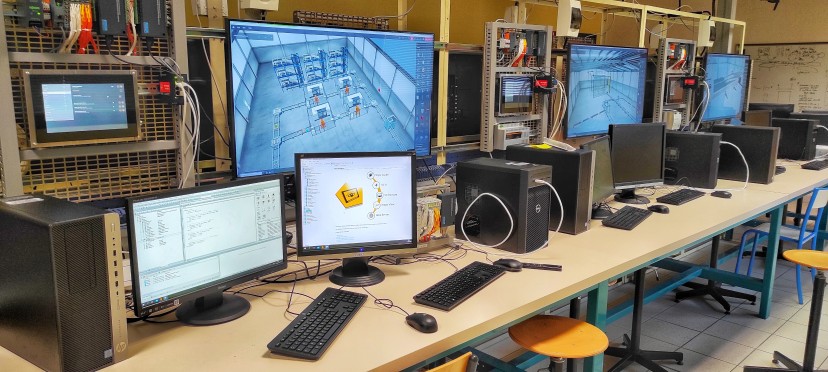Industrial computing represents a specialized branch of applied computing, encompassing design techniques and programming of computerized systems dedicated to industry. This discipline plays a crucial role in ensuring the operation of automation systems in various industrial sectors. It is distinguished by its ability to optimize information flows by connecting communicating production equipment while ensuring real-time processing performance. The rise of Industry 4.0 reinforces its importance, particularly with the integration of cutting-edge technologies such as artificial intelligence and the Internet of Things.
Table des matières
ToggleGlossary of Industrial Computing
Industrial Computing: Industrial computing is a branch of applied computing that encompasses the design, analysis, and programming techniques of computerized systems in an industrial context. It plays a crucial role in optimizing and automating production processes by connecting computer systems to production equipment.
Automation: Automation in industrial computing refers to the use of technological systems to control industrial processes with little or no human intervention. This improves the efficiency, quality, and safety of industrial operations.
Embedded Systems: These are computer systems integrated into machines or devices to perform specific functions. Often designed to operate in real-time, embedded systems are essential for controlling industrial equipment.
Real-Time: In industrial computing, real-time processing refers to a system’s ability to respond to operations within a short and predictable timeframe. This is vital for ongoing control and monitoring of industrial processes.
Industrial Software: These software applications are specifically designed to ensure the operation of automation and computer applications in the industry. They allow for the collection, processing, and transmission of data to optimize manufacturing operations.
ERP – Enterprise Resource Planning: ERP is software that integrates the main management functions of businesses, such as inventory management, production, and logistics. Industrial computing often connects ERPs to production equipment, facilitating the management of information flows.
Fab Labs: These manufacturing laboratories are spaces equipped with a set of digital fabrication tools. Fab Labs have become essential players in manufacturing innovation and the industry of the future, enabling rapid prototyping and custom design.
Industry 4.0: This is the fourth industrial revolution characterized by the integration of digital technologies, the Internet of Things (IoT), and automation in the industrial sector. Industrial computing is a key element of Industry 4.0, facilitating the interconnection of systems and real-time data analysis.
OPC-UA: This is a standard protocol used for the secure and reliable exchange of data in connected industrial systems. It enables interoperability between different equipment and systems, playing a crucial role in optimizing industrial processes.
Cybersecurity: In the era of Industry 4.0, cybersecurity becomes crucial for protecting connected industrial systems against cyberattacks. The security of industrial infrastructures ensures operational continuity and the protection of sensitive data. To learn more, refer to this article on cybersecurity in the era of Industry 4.0.
Data Analysis: Data analysis plays a fundamental role in optimizing industrial performance. With big data and analytical technologies, the data collected by industrial computing systems can be leveraged to improve processes, reduce costs, and anticipate breakdowns.
For more information on technological revolutions in industry, explore CognitIoT and real-time advanced computing.

FAQ on Industrial Computing: Brief Explanation
Q: What is industrial computing?
A: Industrial computing is a branch of applied computing that focuses on the design, analysis, and programming of computerized systems in an industrial environment.
Q: What are the main aspects of industrial computing?
A: It encompasses all design and programming techniques, including connecting communicating production systems to optimize information flows.
Q: What tools are used in industrial computing?
A: Tools for industrial software are used to automate computing operations in various industrial sectors, as well as to ensure effective communication between production equipment.
Q: What are the challenges of industrial computing?
A: The main challenges include the behavior of computing equipment in an industrial environment, the transmission of digitized data, and ensuring real-time performance.
Q: Why is industrial computing important?
A: It is essential for optimizing operational efficiency, enabling predictive maintenance, and improving automation of production processes.





